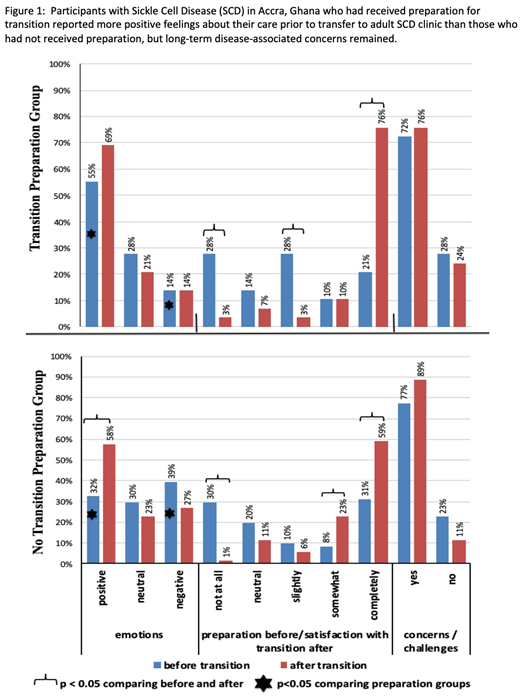Background: Sickle Cell Disease (SCD) is a significant global health problem. Previously considered an illness restricted to childhood especially in low-resource areas, more patients are surviving into adulthood. Expanding SCD services in Ghana has improved survival.(Ohene-Frempong K., Pediatrics 2008) Thus, the period of transitioning from pediatric to adult SCD care is important. This period presents challenges that transition preparation could help address.(Quinn C., 2010) We sought to understand past transition experiences of adolescents and young adults (AYAs) at the Ghana Institute of Clinical Genetics (GICG), an adult SCD clinic. We hypothesized that receiving prior transition preparation would positively influence participants' transition experiences to the adult clinic.
Methods: Structured interviews were conducted with AYAs ages 13 to 22 years receiving routine SCD care at GICG. Participants were asked to recall transition preparation on the pediatric side, emotions, concerns and overall satisfaction with transition experience, and current perception of SCD self-care abilities. Questions used in the structured interviews were informed by existing SCD transition surveys and focus groups and modified to be culturally appropriate for Ghana.(Telfair J., 1994, Sobota A., 2015) Interviews were conducted in English or Twi per participant preference. Responses were transcribed and translated into English, as needed, for summary and comparative statistics.
Results: One hundred participants were consented, interviewed and included in the analysis, mean age 17.9±2.9 years and 65% female. The majority had HbSS (77%), 30% HbSC and 3% not readily available. Average age of first visit at the adult clinic was 14.4±2.8 years. Only 29% of participants indicated receiving some type of transition preparation. Of these, 52% visited the adult clinic with pediatric staff, 34% participated in a transition program on the pediatric side, and 24% had a visit with the pediatrician without parents present. Prior to their actual transition, participants in the transition preparation group were more likely to report having had positive emotions (happy, comfortable) about needing to transition to adult care than those without transition preparation (55% vs 32%, p = 0.03). No other statistically significant differences were found between the two groups' responses to concerns prior to transition, challenges faced after they started attending the adult clinic, and overall satisfaction with their transition experience. Overall, 85% of participants reported having initial challenges at GICG upon transition, including not knowing the staff on the adult side and being unfamiliar with speaking to doctors on their own. Despite those difficulties, (61%) reported positive emotions after their first adult visit, and 64% reported feeling satisfied with their overall transition experience because they became familiar with the staff and experienced short wait times at visits. Over half of participants were very confident in their SCD self-care abilities. Only 25% were very confident about dealing with the frustrations of having SCD and 62% did not feel comfortable telling their peers they have SCD due to stigma. Most participants (92%) believed their health would improve in the future.
Conclusions: As reported elsewhere, transition preparation among Ghanaian AYAs at our single study site is highly variable. Most study participants reported no transition preparations prior to adult care. Regardless of preparation received, participants had concerns and challenges with transitioning. Similar to our previous study of younger patients prior to transition, concerns about peer stigmatization persisted in this sample of AYA patients. (Kwarteng-Siaw M., 2017) Despite this, our study shows a modest but significant benefit in emotions of AYAs receiving transition preparation for adult SCD care. These findings emphasize the importance of transition services in SCD care in Ghana. Generalizability of our findings and practical methods to address needs for SCD transition within Africa remain to be tested.
No relevant conflicts of interest to declare.
Author notes
Asterisk with author names denotes non-ASH members.


This feature is available to Subscribers Only
Sign In or Create an Account Close Modal